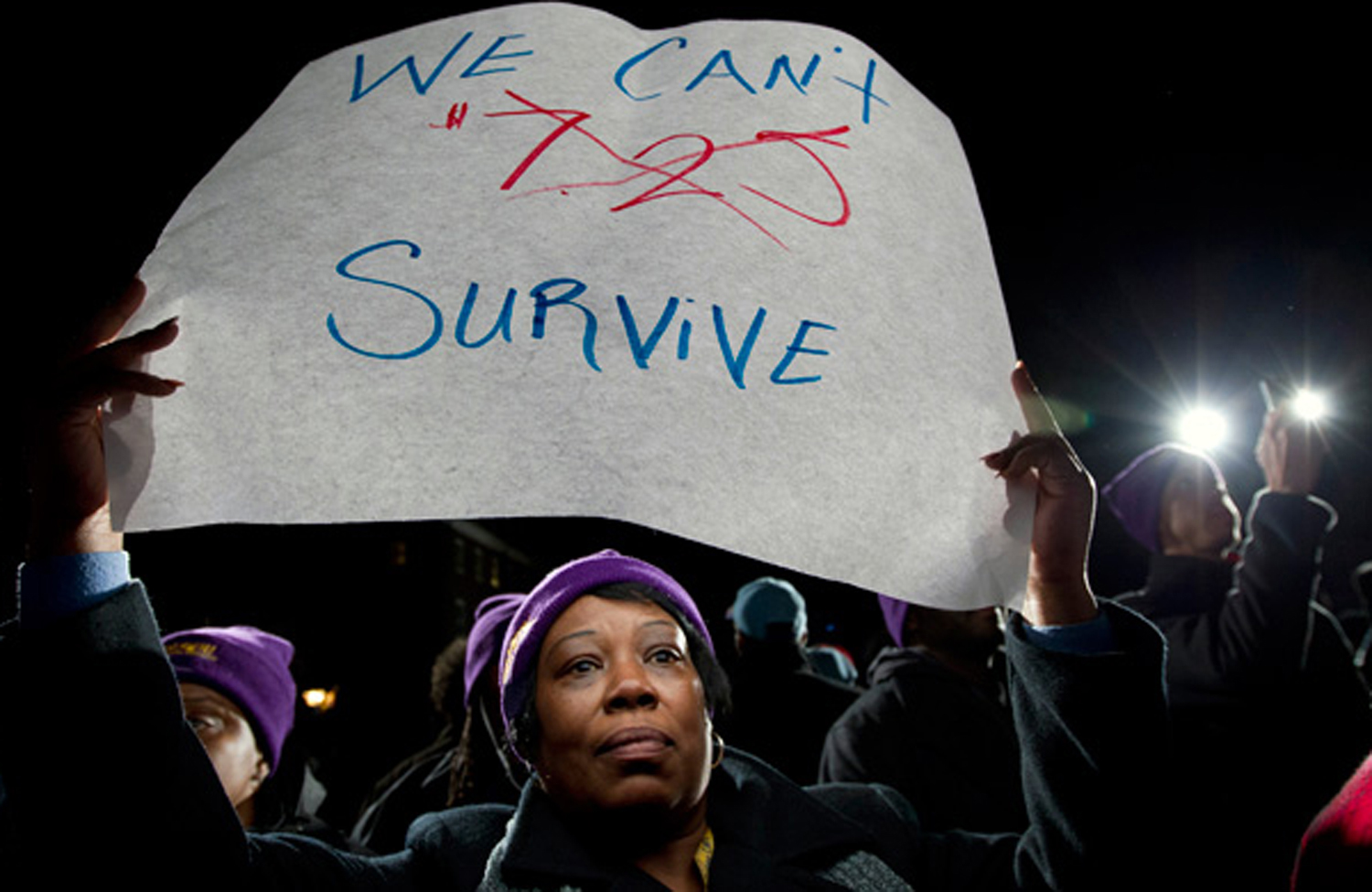
What Happens When People—Rather Than Politicians—Are Given the Chance to Vote for a Higher Minimum Wage? What Happens When People—Rather Than Politicians—Are Given the Chance to Vote for a Higher Minimum Wage?
Who decides the minimum wage? In several ballot initiatives next week, the people will.
Oct 29, 2014 / Blog / Michelle Chen
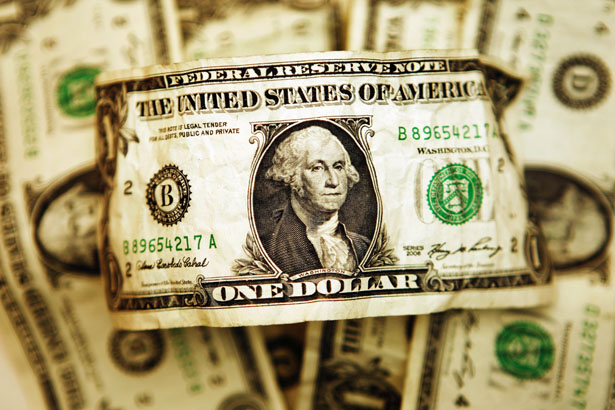
The Score: Does the Minimum Wage Kill Jobs? The Score: Does the Minimum Wage Kill Jobs?
Throw a rock into the punditsphere and you’ll hit someone arguing that minimum-wage increases kill jobs. We shouldn’t boost the wage, these people argue, because companies will hire fewer of the lowest-paid workers—the very workers who are supposed to be helped. Meanwhile, social movements like Fight for 15 demand a higher minimum wage in order to raise the living standards of these workers. To a degree, the relationship between the minimum wage and employment is still debated among economists. When thirty-eight of them were polled last year, they were split as to whether a $9 hourly wage would cost jobs, with about a quarter unable to say one way or another. The debate pits the Congressional Budget Office, which found that a $10.10 wage would reduce employment by 0.3 percent, against economists like David Cooper, who found that a higher minimum wage would support the creation of 85,000 new jobs. So which is it: Does raising the minimum wage boost living standards for workers, or does it kill jobs for those who need them most? Taking stock of all the conflicting research on the topic suggests the former: employment is unlikely to suffer from a higher wage. In 2009, Hristos Doucouliagos and T.D. Stanley published a paper that reviewed sixty-four studies and found that when the studies’ findings were averaged out, the impact of raising the minimum wage on employment was close to zero. Also, the most statistically precise studies were the likeliest to find no impact. Increasing the wage by 10 percent could reduce employment by a mere 0.1 percent. Critics suggest that employers of low-income workers will replace them with machines if their labor becomes more costly. But in the real world, businesses are run by human beings who make a range of choices. Bosses often respond to higher labor costs not by cutting workers, but by requiring workers to be more efficient. They may reduce bonuses for higher-paid employees. They could pass the cost on to customers through higher prices, although a review of academic papers found that a 10 percent wage increase raised prices by no more than 0.4 percent. Most important, employers are likely to find that a higher wage reduces costly job turnover among trained workers. Higher wages also put more money into workers’ pockets—to the tune of some $30 billion—which would then be spent at these businesses. Real-world evidence is reassuring. In 2010, three economists looked at 1,381 counties over sixteen years, finding that minimum-wage hikes had no effect on employment. Other economists looked at every state-level minimum-wage increase over twenty-five years at times when unemployment was already high and found no evidence of an effect on job creation. Yet another group looked at the effect of state-level increases on teenagers—canaries in the coal mine of low-skilled employment—and found zero impact on their jobs. Even this year, the thirteen states that raised their minimum wages on January 1 have experienced higher employment growth than those that didn’t. Washington, the state that has boasted the highest minimum wage for fifteen years, had a job-growth rate 0.3 percentage points above the national rate. It’s impossible to draw a clear line of causation from a higher minimum wage to job growth, but the hikes clearly did not torpedo local economies. Across the board, there’s little reason to think that a higher wage would decimate job growth and good reason to think it could give the economy—and workers—a boost. Bryce Covert Myth: The minimum wage is a living wage. Reality: One full-time minimum-wage job used to be able to keep a family of three above the poverty line. Now it can’t keep a single parent above the poverty line. Myth: Mostly teenagers in short-term jobs make the minimum wage. Reality: Nearly 90 percent of the workers who would be affected by a minimum-wage hike are older than 20, and 28 percent of them are parents. Myth: Minimum-wage jobs like fast food are just entry points to better-paid careers. Reality: In the minimum-wage fast-food industry, there are far fewer managerial positions to move into than in other industries, and few franchise ownership opportunities. half-full: Ten states have passed minimum-wage increases this year, five above $10 an hour. half-empty: Congressional Republicans have blocked a federal minimum-wage increase three times over the past three years despite supporting one under President George W. Bush.
Oct 8, 2014 / Editorial / Mike Konczal and Bryce Covert
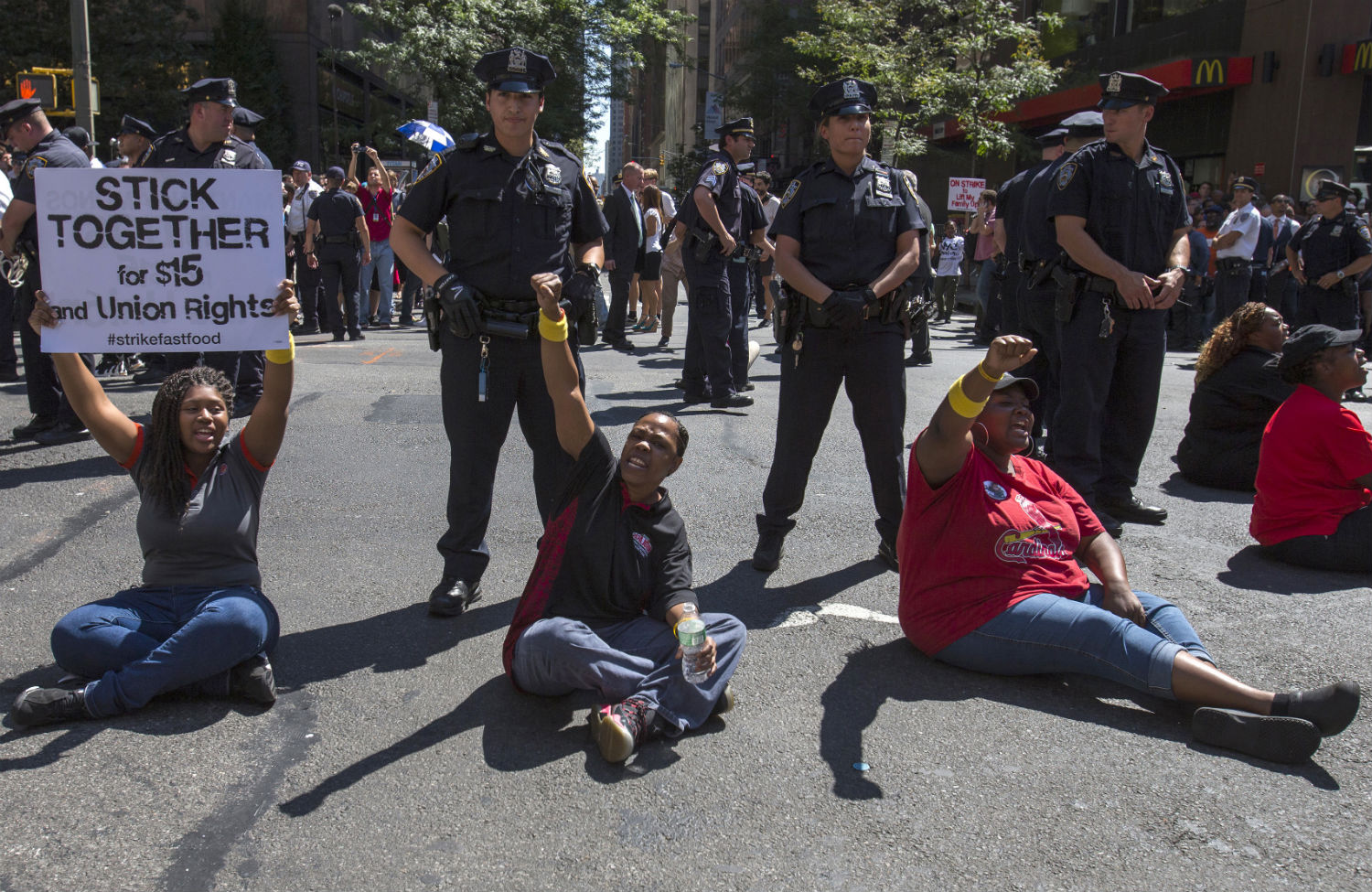
$15 and a Union: Fast-Food Workers Take Their Demands Nationwide $15 and a Union: Fast-Food Workers Take Their Demands Nationwide
Nearly two years since their mobilization began with about 200 workers in New York, fast-food workers are following through on their two key demands: a $15 hourly wage and a union....
Sep 5, 2014 / Blog / Michelle Chen
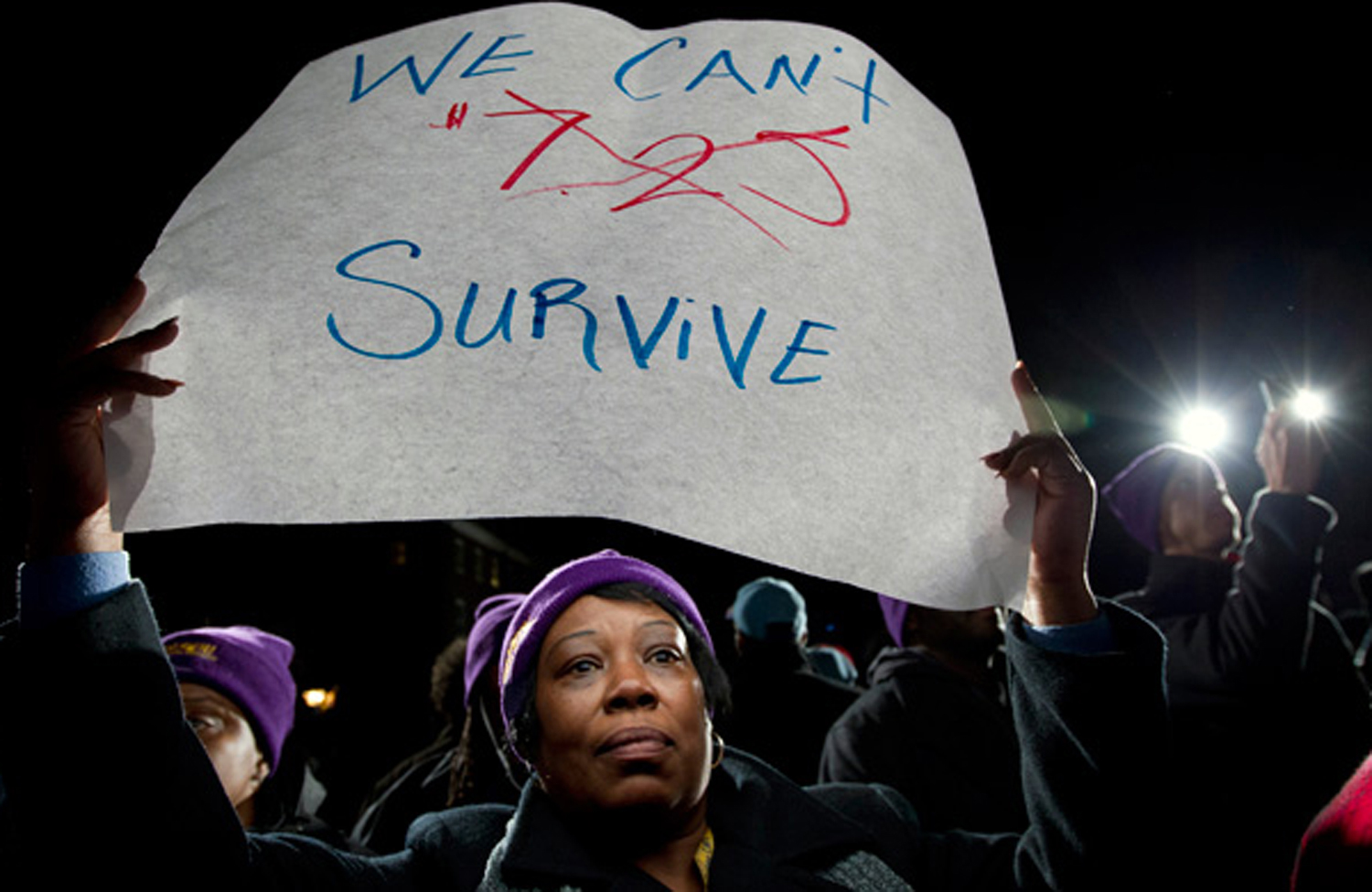
Let’s Tell Congress to Raise the Minimum Wage… Right Now! Let’s Tell Congress to Raise the Minimum Wage… Right Now!
Instead of waiting for the perfect Congress, Americans should demand that this imperfect Congress act before the election.
Sep 2, 2014 / Blog / John Nichols
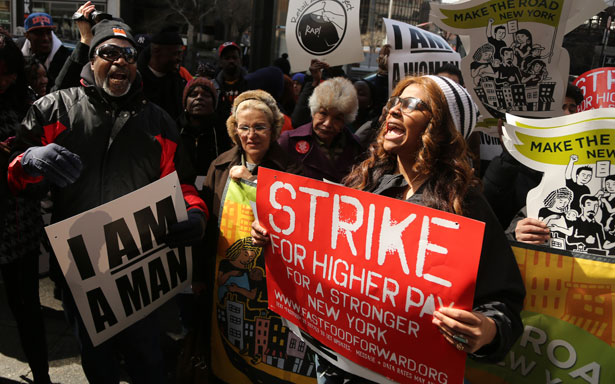
The True Meaning of Labor Day The True Meaning of Labor Day
For America’s workers, Labor Day marks more than the end of summer. It’s a reminder of the struggles we have won—and those that lie ahead.
Aug 29, 2014 / Mary Kay Henry
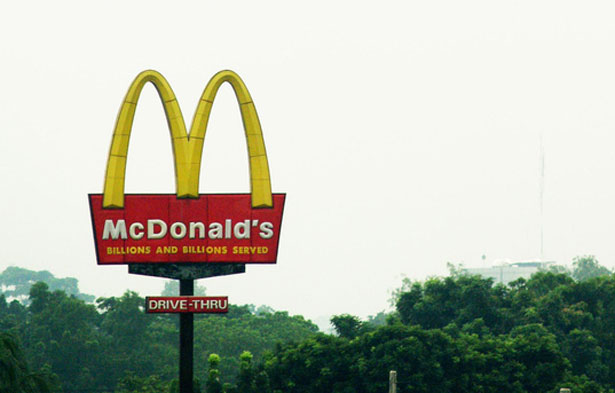
This Ruling Just Gave Workers a Big Boost in Their Fight Against McDonald’s This Ruling Just Gave Workers a Big Boost in Their Fight Against McDonald’s
The fast-food giant must now admit that it’s responsible for the people it employs.
Aug 1, 2014 / Blog / Michelle Chen

RI Workers Won’t Back Down on Living Wage, Despite Democrats’ Betrayal RI Workers Won’t Back Down on Living Wage, Despite Democrats’ Betrayal
A minimum-wage pre-emption measure, backed by the hotel industry and signed by Governor Chafee, has been met with hunger strikes, electoral challenges and protests.
Jun 27, 2014 / Sam Adler-Bell
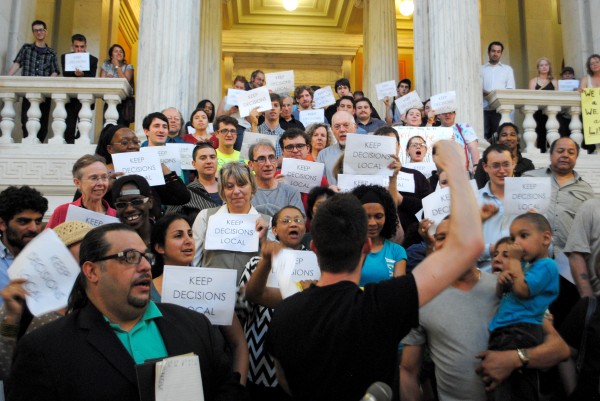
Why Are Rhode Island Democrats Blocking Minimum-Wage Increases? Why Are Rhode Island Democrats Blocking Minimum-Wage Increases?
With friends like this, who needs Republicans.
Jun 11, 2014 / Sam Adler-Bell

$15! A Great Big Wage Hike in Seattle, a Great Big Movement Nationally $15! A Great Big Wage Hike in Seattle, a Great Big Movement Nationally
As a major city opts for a minimum wage that’s double the federal rate, what seemed an improbable goal gets very real.
Jun 2, 2014 / Blog / John Nichols
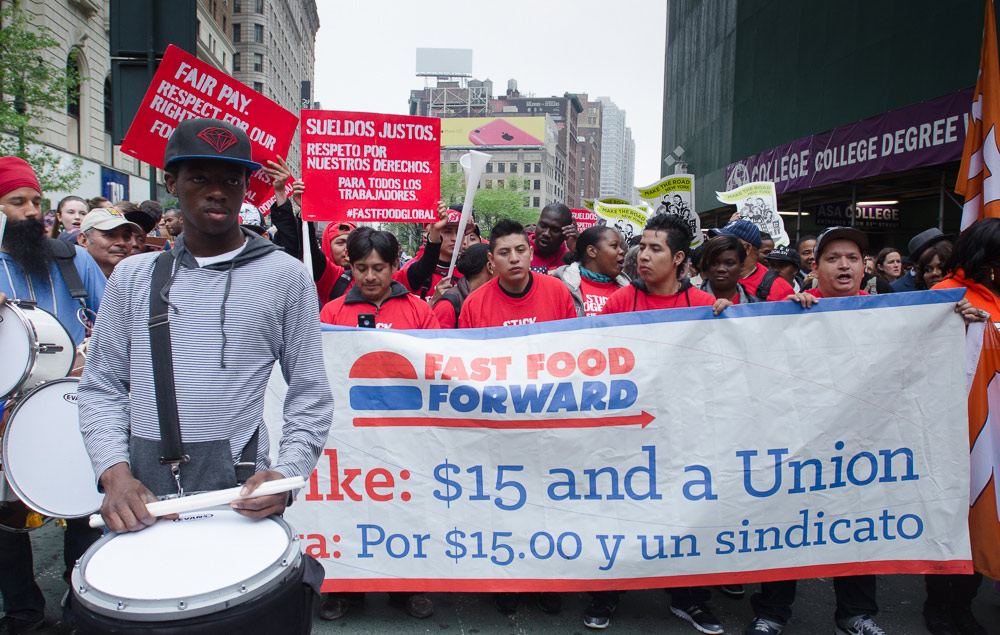
The Fast-Food Worker Movement Has Gone Global The Fast-Food Worker Movement Has Gone Global
In a show of international solidarity, scores of fast food workers in about thirty countries walked off the job to push for improved working conditions and higher wages.
May 16, 2014 / Blog / Michelle Chen
